Introduction
Self-awareness is the ability to examine oneself from various points of view and offer criticisms. It involves the continuous observation of one’s qualities, actions and emotions and attempts to analyse them and improve. As such, self-awareness is critical for one to learn to improve without the need for continuous outside assistance. It is particularly crucial for leading positions, who have large responsibilities and significant power that enables them to make the choices they consider to be best.
The author currently lacks a sufficiently complete understanding of self-awareness to satisfy the demands of their profession. Moreover, the literature on the topic does not provide an adequate. This weakness can be problematic in their future work due to the associated inability to grow as a professional. As such, in Part A, they will research the concept by conducting a literature review and designing a practical study, and in Part B, they will present a storyboard that resulted.
Research Aim
This research aims to establish and demonstrate a comprehensive understanding of self-awareness and the methods used its development to managers. The author currently lacks knowledge on the topic, which is concerning because of the possible dangers that may result. Management is complex and often requires competencies other than leadership for success, depending on the situation. However, in cases of both rapid successes and repeated failures, one is likely to stop growing and trying to adapt.
In the first case, it would be because the person is convinced of the superiority of his or her approach. In the second, it may be because the manager is convinced that his or her core management competencies are inadequate and focuses on them to the detriment of more important causes. Self-awareness can enable one to continuously evaluate oneself and determine what they can do in any situation to maximise success.
Research Context
This paper focuses on management, represented by the Chartered Management Institute, as its central topic. The profession involves leadership on all levels, starting with the oversight of a team and going to the exertion of control over large organisations (Zumitzavan & Michie 2015). As such, it is associated with significant responsibility and the potential for abuse by ill-intentioned actors. It is relatively easy for a person in a position of power to use it for personal advantage at the expense of other people. Moreover, a critical decision-maker may commit a severe mistake and jeopardise the livelihoods of numerous people if the organisation’s condition deteriorates as a result (Mead 2016). Overall, the management profession requires high competencies of the people who intend to succeed in it and achieve the best possible performance for the organisations under their oversight.
The CMI has an extensive set of standards that ensures its members are outstanding performers in the profession. This research will choose the three that are most suitable for its focus on self-awareness. Of the various standards featured by the Chartered Management Institute (n.d.), the most relevant are acting in the best interests of one’s stakeholders, developing and maintaining one’s professional competence and respecting one’s co-workers. With regards to the first trait, one should separate personal and professional interests and avoid letting the two overlap. In addition to understanding what their organisations need of them, managers should be able to understand the relationship between their abilities and those across the field. Many of one’s subordinates will not have the qualities required to perform the same task, which can create skewed comparisons from the manager’s viewpoint. Self-awareness can help one understand that those people are just as capable as the manager, though their abilities may lie in a different direction that is not accessible to the leader.
Overall, several of CMI’s central values are closely related to self-awareness, but the institution does not mention the concept explicitly. It leaves the specific efforts that are necessary to achieve these critical characteristics to the person. The author believes that the failure to feature a vital ability such as self-awareness is a significant weakness in the code’s design. It assumes that such knowledge is implicit and commonplace in the field, a supposition that is not necessarily true. Due to this lack, they will have to conduct additional research elsewhere and find a suitable method for the development of self-awareness. To do so, they will conduct a literature review with the aim of understanding self-awareness and its relevance in the field of management.
Literature Review
Self-awareness has many different definitions, which are typically split based on context, such as cultural or emotional applications. Gahagan (2015) mentions forms such as the awareness of private events, understanding of oneself as a public figure, knowledge of one’s value and the knowledge that one controls their actions. All of these aspects are relevant to a manager, and they should understand the many different expressions of self-awareness and use them to obtain an advantage.
As mentioned above, self-awareness has many specific features that are typically emphasised in specific literature. Bennett (2015) mentions cultural self-awareness, or the ability to review the various cultures to which one belongs critically. Mangal and Mangal (2015) highlight emotional self-awareness, which is the understanding of one’s emotional state at all times. There are also numerous other competencies, but they can generally be incorporated into one of the larger paradigms.
Self-awareness is known for its ability to improve one’s performance as a manager. As Sutton, Williams and Allinson (2015) claim, it enhances one’s general ability to work productively, particularly in the long term. It improves one’s well-being and the ability to communicate in the workplace, which is critical for a manager (Adigwe & Okoro 2016). Overall, self-reflection appears to be a highly beneficial method of improvement for core competencies for many professions.
One should embrace a particular methodology to improve their self-awareness comprehensively in a given time frame. However, as Rubens et al. (2018) claim, an extensive self-evaluation is required first before one can begin planning an improvement program. Frazier and Eick (2015) highlight the benefits of reflective journaling for learners when augmented by the multi-medium approach enabled by modern technology. Knapp, Gottlieb and Handelsman (2017) discuss the development of self-reflection during work through actions such as expressive writing. Overall, there is a multitude of methods from which one can choose the most suitable.
All of the research above is mostly theoretical and does not provide specific guidelines for how one may improve their self-awareness. As such, the review is not sufficient for one to grow as a professional. It is necessary to consider specific practical measures and implement them to create an upward trajectory. The section below provides the various findings generated in that process and outlines the study design.
Research Design, Methodology and Method
The goal of the study is to increase the author’s self-awareness, as it is currently not enough to satisfy the demands of their profession. To that end, the Gibbs reflective cycle will be employed as the primary method used to achieve these goals. It will be supplemented by two additional data collection practices, namely the 16 Personalities test and a questionnaire. These approaches will be used to obtain an outside perspective on the author’s abilities and compare them to their self-evaluation. The combination should help identify the issues regarding the researcher’s self-understanding and suggest avenues for improvement.
The 16 personalities test has resulted in the ESFJ-A personality type for the author, alternately known as the Consul. The concerns of this variety are a lack of flexibility and a reluctance to innovate (Your personality type is: consul 2020). With regards to the self-awareness questionnaire, the primary issues discovered were a weakness in reflective observation and abstract conceptualisation (Jones 2018).
As such, it is critical that the author continues self-reflecting and considering hypothetical scenarios and ideas. The Gibbs reflective cycle can be beneficial for the first aspect, but there is no preset framework for doing the second aspect, and the author will have to improvise. In doing so, they will continue improving upon the weaknesses of both their overall personality and self-awareness.
Methodology and Method
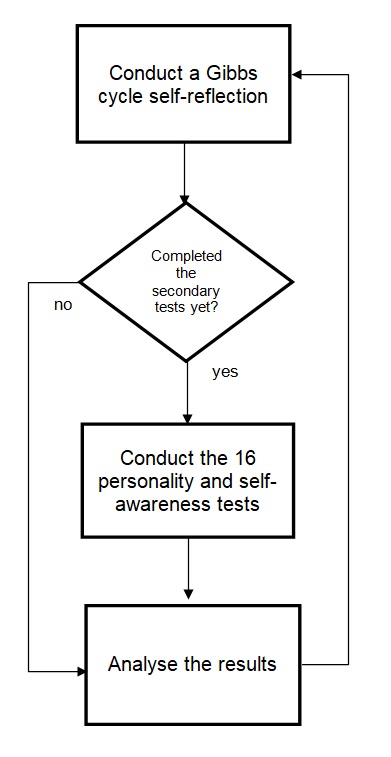
It is essential to understand the differences between various qualitative self-reflection methodologies when selecting one. Some of them may appear similar, but they are distinct and are used in different situations. Gibbs’ reflective cycle involves the six stages of describing the experience, recording it, evaluating it, analysing it, making a conclusion and creating an action plan for the possibility that the situation arises again (Sicora 2017).
The Gibbs cycle provides a useful and efficient framework of actions for reflection that is easy to understand and follow (Knott & Scragg 2016). As such, it is the best method for an introductory exploration of self-reflection and will be used in this paper.
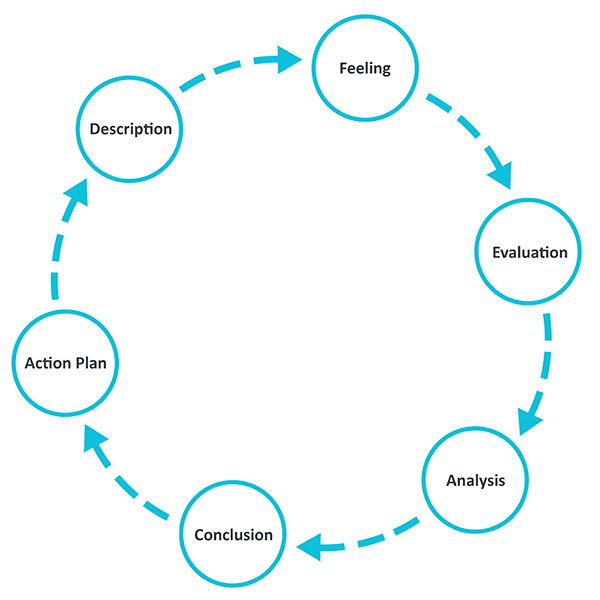
The six stages of the Gibbs cycle warrant a description in more detail due to their potential overlap. The description stage involves an overall analysis of the situation, including the actors present and the events that occurred. The feelings aspect involves both the person’s emotions regarding the matter and their opinion of what others may have felt:
Shortly after the Internet discovered itself,
I set out to be an explorer; not of land and water,
but a finder of the odd and peculiar.
My first inclination
was to search for antiquarian artifacts,
but lacking the knowledge of said artifacts,
I thought to be a ‘picker’ and a junk collector,
or even a mildly addicted hoarder.
Knowing little of buying and selling,
and next to no space for storing anything,
I had to re-think the whole exploring business.
Lacking funds to travel far,
I commenced to explore myself.
Having only a limited aptitude for self-awareness,
I sought the aid of many spiritual agencies.
Lacking the sensitivity to receive their help,
I turned to drinking and writing poetry.
Lacking anyone else to blame but myself,
I determined to blame the Internet,
especially Internet Explorer (Ashford 2019).
In the evaluation step, one decides what went well or poorly and how one’s involvement affected the situation. The analysis stage takes these results and attempts to create an understanding of the reasons why events occurred as they have. The conclusion stage follows, where one summarises what one has learned from the situation and how it may have been improved. Based on these findings, the researcher formulates the action plan for actions they will take next time and the learning for the future that they will conduct to prepare (Beesley, Watts & Harrison 2018). They can then return to the description stage whenever another incident occurs, restarting the cycle.
The two supplementary approaches used are the 16 personalities test and the self-awareness questionnaire. The former is designed to evaluate one’s overall character and highlight specific strengths and weaknesses (Korgen 2015). Some of these aspects will be related to self-awareness, which makes the test helpful for the task (Cutrer et al. 2019).
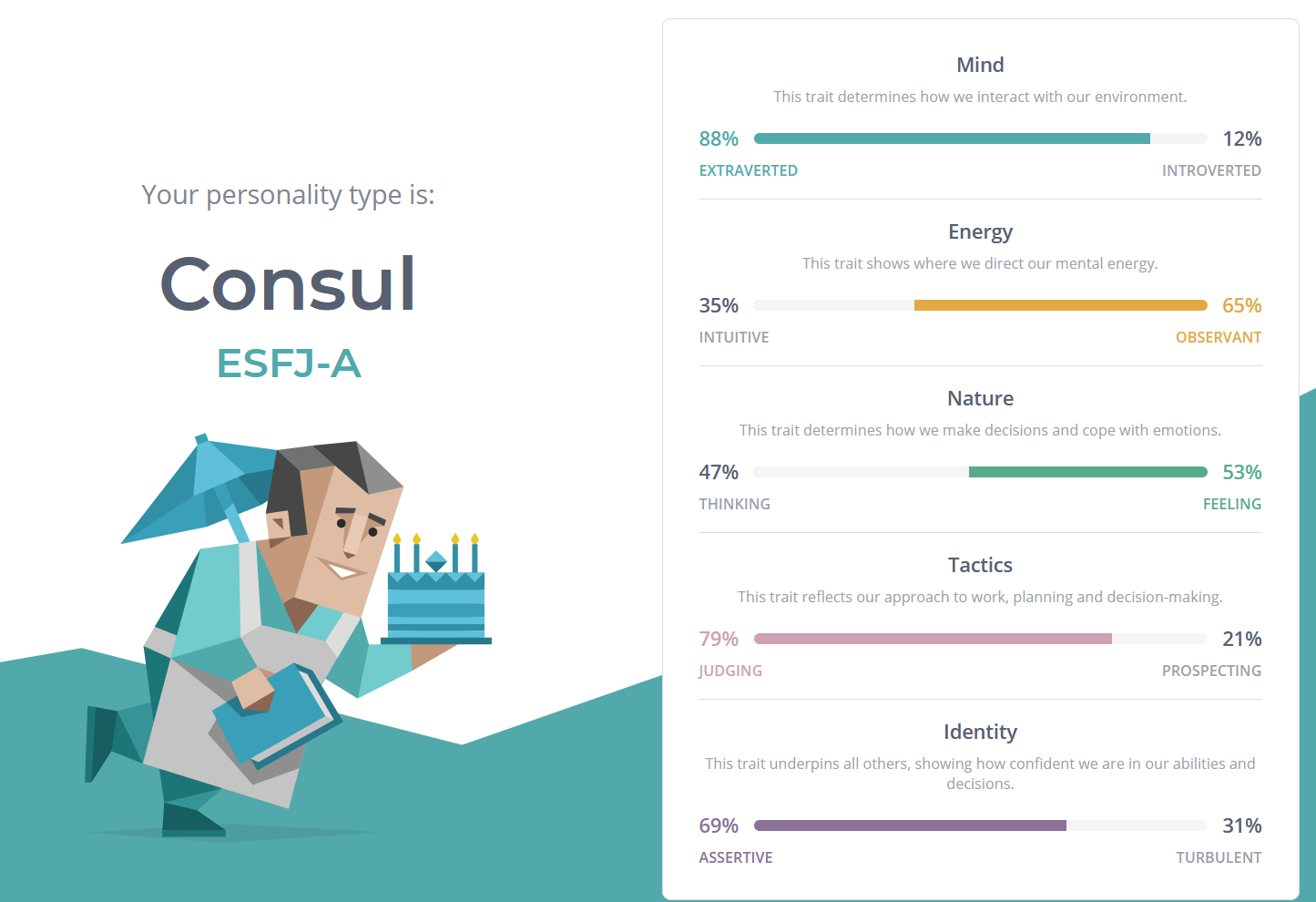
However, it is still somewhat generalised, and a specialised self-awareness survey will be beneficial to enhance the results. It will address more specific aspects of the trait such as more abstract expressions and highlight in what aspects one is stronger or weaker. By combining the two tests, one can change their outlook on themselves and begin working on improvement.
Research Process
In the beginning, I did not know about management and the various methods I could employ to become better at it. I was familiar with CMI’s values and believed that I observed them accurately. However, I did not realise that there was potential for self-improvement because I considered these values to be static. As I learned about self-awareness, I realised that this approach was inadequate and that there was significant personal growth potential based on self-awareness.
In particular, self-reflection became a point of particular interest for me because of how it differed from what I would usually do after an incident. It involved several comprehensive theoretical frameworks that were simple but more elaborate than my disorganised methods. As such, I chose the Gibbs reflective cycle to try to enhance my self-awareness and learn from the events surrounding me.
I applied the Gibbs cycle to an incident at work where I was expected to arbitrate a conflict between two parties that supported different decisions. I found that I did not handle the situation adequately because I let my bias against risky proposals dominate the decision process.
In doing so, I disregarded the interest some of my subordinates had in distinguishing themselves and antagonised them. I should have been more clear with my reasoning and tried to mediate the dispute so that the party whose options was not chosen could be satisfied with the process. Next time, I will encourage a more open discussion and allow everyone to express themselves before the decision is made. To do so, I will work on my conflict management skills and try to communicate more openly in the future.
The cycle has identified some weaknesses, but it operates slowly, and other approaches can be used to develop self-awareness alongside it. As such, I have used the 16 personalities test and a self-awareness questionnaire to enable further self-analysis. The former has produced results that suggest I may have flexibility issues and am unwilling to innovate, which is consistent with the incident above. The latter claims I have reflective observation and abstract conceptualisation deficiencies.
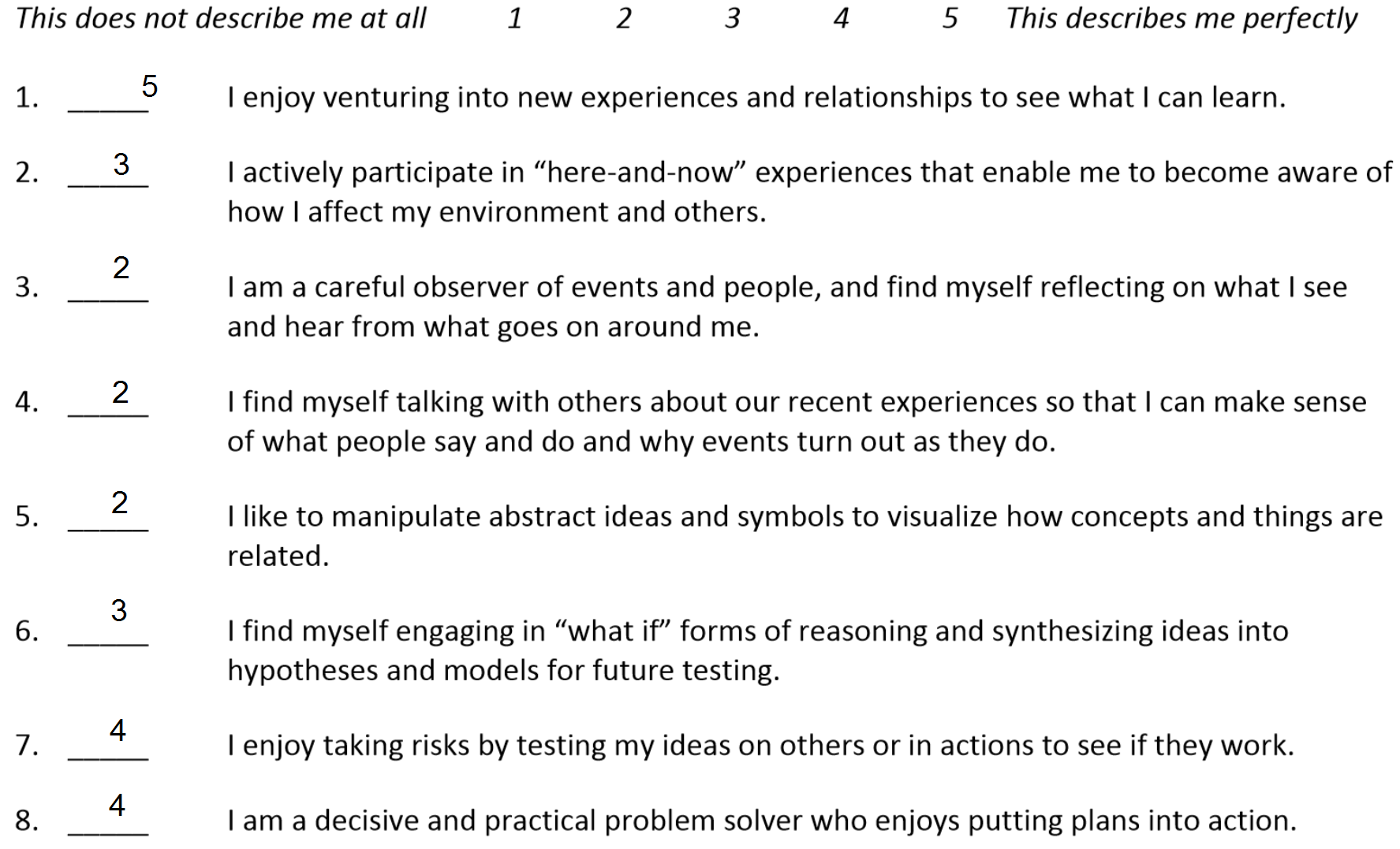
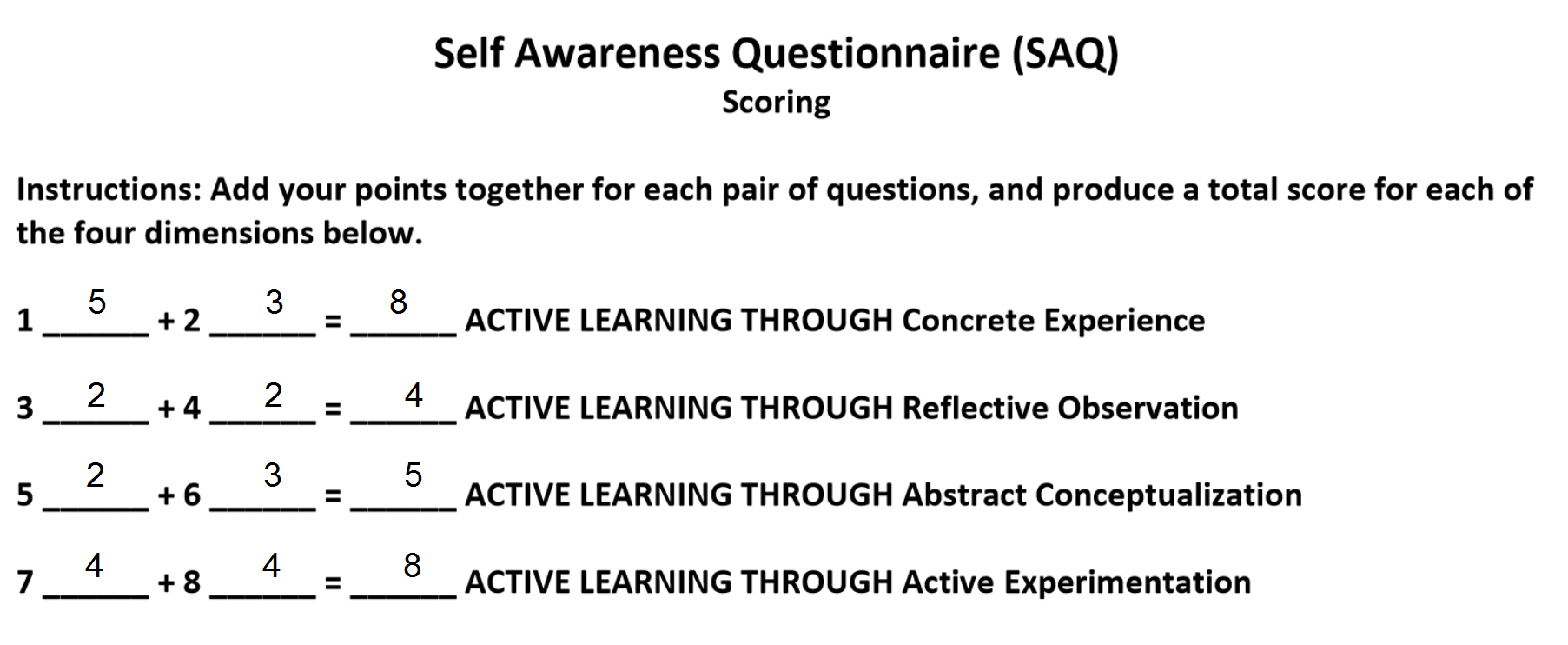
These results are also in agreement with the incident, and they provide me with detailed information on what I should enhance. Namely, I should continue using the cycle and try to develop a more active imagination, being open to considering new ideas and thinking about concepts that do not have an immediate practical application.
In the future, I will try to apply what I have learned from this study in my everyday work and further self-awareness improvement attempts. I may choose to try a different methodology or method once I become more familiar with the field and can compare the advantages and disadvantages of other models. I will also be more vigilant in identifying problematic situations and the role I play in resolving or complicating them. I will also try to find ways in which I can apply myself to improve the performance of my team and prevent any problems from emerging. Overall, the introduction to self-reflection and the increased knowledge of self-awareness are the most significant benefits of this research.
Storyboard
Key Event
As mentioned above, the key event was a conflict situation at work where my subordinates disagreed on a project decision. The decision would affect the future operation of the project significantly, and the two were mostly incompatible. One was more traditional and less risky, and the other had better potential but was unusual for the company and may have been dangerous. I chose the first option almost immediately because I was only interested in smooth progress, and the first option would provide adequate results. However, the team members whose proposal was dismissed may have felt that I did not respect their opinion.
Who I Was
I was a manager who expected a reputation improvement and a possible promotion after this project’s successful conclusion. Outstanding results were not required in this project, but failure could damage my reputation significantly. As such, I had a strong preference for stable, low-risk options without realising it. Due to this bias, I dismissed the opinions of my team, some of whom were interested in distinguishing themselves by improving the project and suggested options that may have enabled them to do so. Moreover, I failed to explain my motivations due to my lack of self-awareness. I believed I was acting in the interests of the company, which was not necessarily the case.
Who I Am
Now, I understand the events and the motivations of the various other people involved. However, I am still much the same person and have not changed significantly. For example, I still support my decision because it aligns with my interests, which is the most important aspect for me. I understand that as a leader, I should protect the interests of the entire team, but I find the concept challenging to apply in this scenario. I only antagonised a part of the team, and the rest will support me because they have formulated the original decision that I chose. As such, the coherency of the group has been disrupted, and three distinct bodies have emerged within it.
Who I Want to Be
I want to be a person who can lead teams and have the other members’ trust that I will not put personal interests over theirs. As such, in situations such as this one, I will try to give both sides an equal opportunity to express themselves and reach a decision that satisfies everyone. I will use my authority to make the final choice if necessary, but I would like everyone to feel that they have been heard and that their opinion has been considered. A decision reached by overall consensus would achieve that goal better, especially if it were some form of a compromise reached through bipartisan discussion. To achieve this goal, I will have to be a better communicator and conflict manager.
Conclusion
Due to my lack of self-awareness, I was unable to understand my failing until I conducted a critical reflection. In the future, I will attempt to reach a more complete understanding of the situation and accommodate every team member as well as other interested parties.
Reference List
Adigwe, P & Okoro, E 2016, ‘Human communication and effective interpersonal relationships: an analysis of client counseling and emotional stability’, International Journal of Economics & Management Sciences, vol. 5, no. 3, Web.
Ashford, E 2019, I became an explorer.
Bassot, B 2013, The reflective journal, Palgrave Macmillan, Basingstoke.
Beesley, P, Watts, M & Harrison, M 2018, Developing your communication skills in social work, C&M Digital, Chennai.
Bennett, JM 2015, The SAGE encyclopedia of intercultural competence, SAGE, Thousand Oaks, CA.
Chartered Management Institute n.d., Code of conduct and practice, Web.
Cutrer, WB, Pusic, MV, Gruppen, LD, Hammoud, MM & Santen, SA 2019, The master adaptive learner, Elsevier, Amsterdam.
Frazier, LC & Eick, C 2015, ‘Approaches to critical reflection: written and video journaling’, Reflective Practice, vol. 16, no. 5, pp. 575-594.
Gahagan, J 2015, Social interaction and its management, Psychology Press, Abingdon.
Gibbs’ reflective cycle2019, Web.
Jones, EA 2018, A personality portrait: sixteen biblical leaders who identify your traits, Wipf & Stock, Eugene.
Knapp, S, Gottlieb, MC & Handelsman, MM 2017, ‘Enhancing professionalism through self-reflection’, Professional Psychology: Research and Practice, vol. 48, no. 3, pp. 167-174.
Knott, C & Scragg, T (eds.) 2016, Reflective practice in social work, 4th edn, Learning Matters, Thousand Oaks, CA.
Korgen, B 2015, Reinventing the world, we can do better, First Edition Design Publishing, Sarasota.
Mangal, SK & Mangal, S 2015, Emotional intelligence: managing emotions to win in life, PHI Learning, Delhi.
Mead, WJ 2016, Dietary supplement good manufacturing practices: preparing for compliance, Informa Healthcare, London.
Rubens, A, Schoenfeld, GA, Schaffer, BS & Leah, JS 2018, ‘Self-awareness and leadership: developing an individual strategic professional development plan in an MBA leadership course’, The International Journal of Management Education, vol. 16, no. 1, pp. 1-13.
Self awareness questionnaire2020, Web.
Sicora, A 2017, Reflective practice and learning from mistakes in social work, Policy Press, Bristol.
Sutton, A, Williams, HM & Allinson, CW 2015, ‘A longitudinal, mixed method evaluation of self-awareness training in the workplace’, European Journal of Training and Development, vol. 39, no. 7, pp. 610-627.
Your personality type is: consul 2020, Web.
Zumitzavan, V & Michie, J 2015, Personal knowledge management, leadership styles, and organisational performance: a case study of the healthcare industry in Thailand, Springer, Cham.